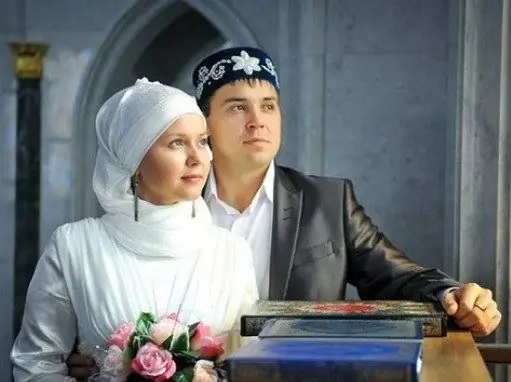- Author Antonio Harrison harrison@cultureoeuvre.com.
- Public 2023-12-16 07:44.
- Last modified 2025-01-22 21:44.
The wedding ceremony of different peoples and representatives of different religions has its own characteristics. For example, those adherents of Islam who strictly adhere to religious rules try to conduct wedding ceremonies in full accordance with them.

How should a bride and groom behave before a Muslim wedding
Many Muslims, especially those living in large European cities and not very zealous in observing religious rules, perform weddings in a compromise style, allowing some deviations from ancient customs and norms. The rules of Islamic morality require that future spouses do not see each other in private before marriage. They can only meet in the presence of other people (usually older relatives). Touching each other, even shaking hands, is strictly forbidden. When meeting with her future husband, the bride should be dressed according to Muslim canons so that only her face and hands are exposed.
The ceremonies immediately preceding the marriage are carried out depending on which nation or community the bride and groom belong to. In most cases, just before the wedding, the bride and groom are visited by relatives, friends and girlfriends. Women gather in the house of the future wife, and men gather in the house of the future husband. Until dawn they congratulate the heroes of the occasion, give them advice on various issues of life together, wish them happiness. Some peoples on this night allow the groom to visit the house of his future wife for a short time.
How is the wedding ceremony
According to Muslim canons, marriage in the registry office does not yet make newlyweds husband and wife in the face of Allah. There is a need for a religious procedure for registering a marriage, which is called "nikah". It usually takes place in a mosque with the obligatory presence of two witnesses, as well as the father or guardian of the bride. The bride and groom's clothing must be worn in accordance with Islamic traditions. Although there are no strict regulatory rules in this regard.
This procedure is carried out by a mullah or imam. He reads aloud the fourth chapter of the Qur'an, which describes the rights and responsibilities of a married woman. The groom is supposed to confirm his intention to marry the bride, and also indicate what property (in cash or in kind) he presents to her as a wedding gift. He is obliged to transfer this gift to his wife within a certain period, or in case of divorce.
After the completion of the nikah, the newlyweds exchange rings. Muslims, unlike Christians, wedding rings are made of silver.
The wedding meal after nikah is traditionally splendid and abundant. Famous oriental sweets are definitely served. Drinking alcohol is prohibited because it is incompatible with the norms of Islam.






